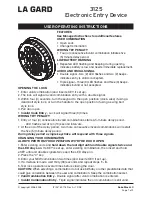
W W W . P S S O . D E
18
Operation
Operate the speaker system only after having
familiarized with its functions. Do not permit operation
by persons not qualified for operating the speaker
system. Most damages are the result of unprofessional
operation!
Transport and Handling
Speaker systems must never be transported with
cranes. Never stack heavy objects on this speaker
system. Persons must never climb onto this speaker
system.
Cleaning
Never use solvents or aggressive detergents in order to
clean the speaker system! Rather use a soft and damp
cloth.
Modifications and Guarantee
Please consider that unauthorized modifications on the
speaker system are forbidden due to safety reasons!
If this speaker system will be operated in any way
different to the one described in this manual, the
product may suffer damages and the guarantee
becomes void. Furthermore, any other operation may
lead to dangers like crashes, hearing loss etc.
..............................................................................................................................................................................
Legal Instructions
Operating an amplification system can produce
extremely high noise levels that may cause a
permanent hearing loss. The legal instructions for using
an amplification system vary from country to country.
The user must always inform himself on the legal
instructions valid in his country and apply them to his
situation.
Always monitor the sound pressure level when
operating an amplification system in discotheques,
concerts etc. Never exceed the permissible noise level
exposures as specified by your authorities. The
monitoring of the noise levels must be documented in
an appropriate way.
In Germany, the following instructions are binding:
Strafgesetzbuch § 223 ff:
bundesrecht.juris.de/bundesrecht/stgb
TA Lärm: www.umweltdaten.de
DIN 15905-5: www.din.de
Arbeitsstättenverordnung § 15:
www.lgl.bayern.de/arbeitsschutz
Berufsgenossenschaftliche Vorschrift BGV B3: www.pr-
o.info
VDI-Richtlinie: VDI 2058 Blatt 2: www.vdi.de
Hearing damage caused by high noise levels can be
treated as physical injury and persecuted by law.
Please note that the organizer is responsible for
keeping to a specified noise level. If this noise level will
be exceeded, the event may be cancelled immediately.
If the organizer does not fulfill his safety duties, he is
reliable by civil law for any damages occurred, e.g.:
Pay the treatment costs of the damaged person. Pay a
smart money to the damaged person.
Economic damage caused can be demanded from the
operator of the amplification system.
If hired persons work with amplification systems: the
noise levels of music events are almost always too
high. This is why the entrepreneur has to set up
warning signs and provide hearing protectors. The staff
has to use these.
PSSO cannot be made liable for damages caused
by incorrect installations and excessive noise
levels!
..............................................................................................................................................................................
Information on Hearing Loss
More and more young people suffer from hearing loss
of 25 decibel or more, mainly caused by loud music
from portable MP3 and CD players or discotheques.
Everybody operating amplification systems should know
to what sound pressure levels he exposes his or the
audience's hearing. As an average levels between 75
and 105 dB(A) in the discotheque or 95 and 115 dB(A)
at a rock concert are reached. Individual peaks can
exceed the pain level at 130 dB(A). Such levels are
typical for motor chainsaws or jack hammers.
It is important to know that doubling the power
increases the noise level by 3 dB. The human hearing
does only recognize a doubling of the sound level when
the noise level is increased by 10 dB. Damaging the
hearing does not depend on the sound level but on the
noise level and starts way before the pain level.
Many people deceive themselves by thinking that noise
is something they can get accustomed to. It is possible
that a positive opinion of a certain noise can reduce the
physiological reaction, but the slow impacts on the inner
hearing must not be neglected: over stimulation and
continuous elimination of the Cortic organ's hair cells.
The reason why some people have got accustomed to
a certain noise level and are no longer disturbed is that
they have already suffered a hearing damage. This
damage makes the insensitive to those frequencies
forming the loudest part of the noise. Getting
accustomed to noise does not mean anything other
than trying to get along with the hearing loss in
everyday life. The hearing loss itself cannot be healed;
it can only be compensated by hearing aids.
Subjectively, the hearing loss feels like dampened ears.
This effect weakens with the time, but a loss in hearing
sensitivity often remains.
In order to relax the hearing sufficiently, the noise level
should not exceed 70 dB(A) for 10 hours. Higher noise
levels during this relaxing period can prevent the
relaxation and promote a permanent hearing damage
(Tinnitus) or hearing loss. Therefore: Whoever wants to
maintain his hearing should use hearing protectors!











































